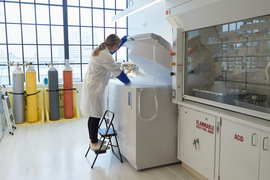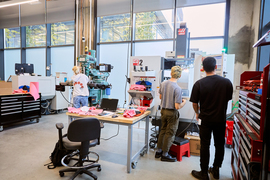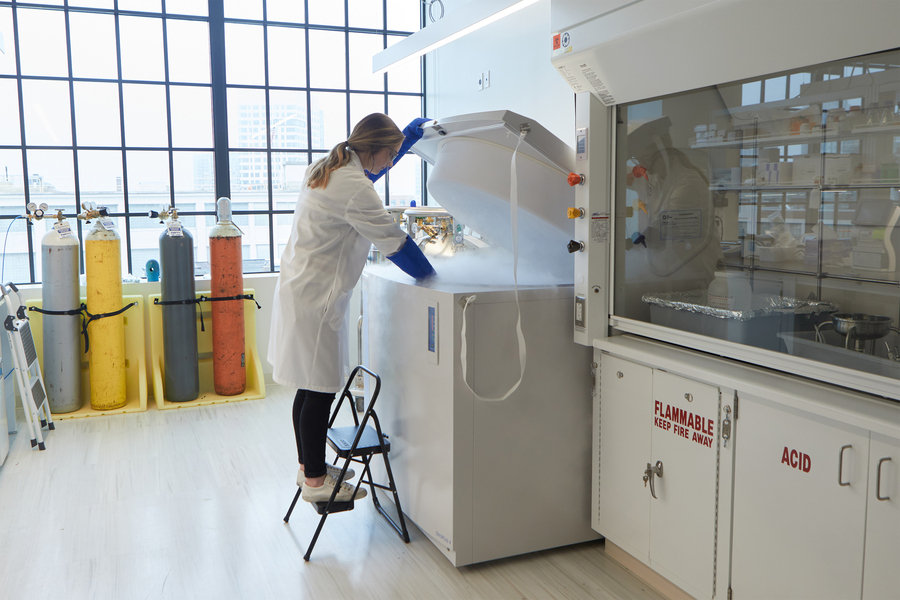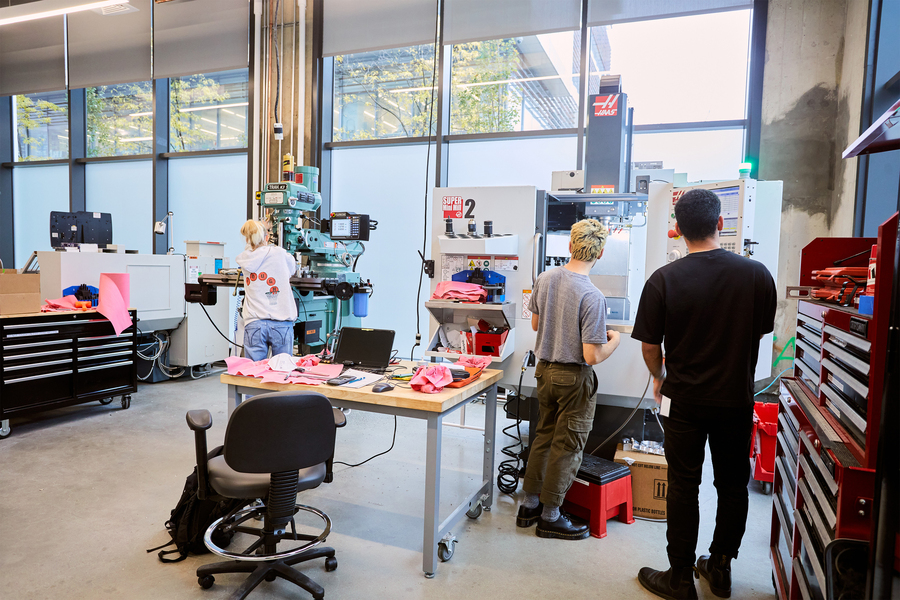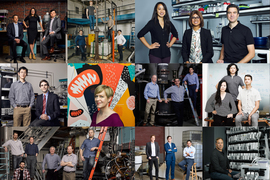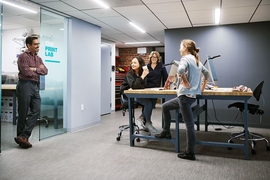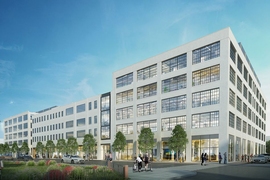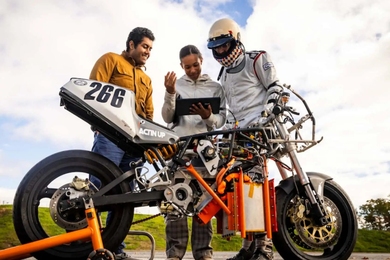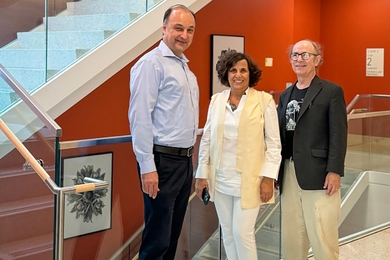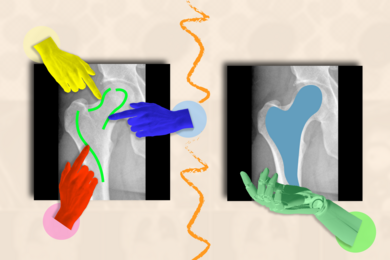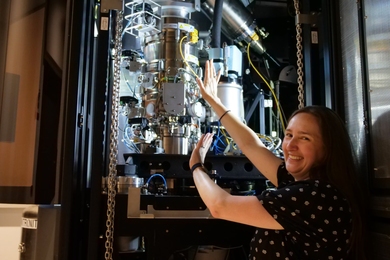In a large, open space on the first floor of 750 Main Street in Cambridge, Massachusetts, a carbon-capture company is heating up molten salts to 600 degrees Celsius right next to a quantum computing company’s device for supercooling qubits. The difference is about 900 degrees across 15 feet.
It doesn’t take long in the tour of The Engine Accelerator to realize this isn’t your typical co-working space. Companies here are working at the extremes to develop new technologies with world-changing impact — what The Engine Accelerator’s leaders call “tough tech.”
Comprising four floors and 150,000 square feet next door to MIT’s campus, the new space offers startups specialized lab equipment, advanced machining, fabrication facilities, office space, and a range of startup support services.
The goal is to give young companies merging science and engineering all of the resources they need to move ideas from the lab bench to their own mass manufacturing lines.
“The infrastructure has always been a really important accelerant for getting these kinds of companies off and running,” The Engine Accelerator President Emily Knight says. “Now you can start a company and, on day one, start building. Real estate is such a big factor. Our thought was, let’s make this investment in the infrastructure for the founders. It’s an agile lease that enables them to be very flexible as they grow.”
Since the new facility opened its doors in the summer of 2022, the Accelerator has welcomed around 100 companies that employ close to 1,000 people. In addition to the space, members enjoy educational workshops on topics like fundraising and hiring, events, and networking opportunities that the Accelerator team hopes foster a sense of community among people working in the tough tech space overall.
“We’re not just advocates for the startups in the space,” Knight says. “We’re advocates for tough tech as a whole. We think it’s important for the state of Massachusetts to create a tough tech hub here, and we think it’s important for national competitiveness.”
Tough tech gets a home
The Engine was spun out of MIT in 2016 as a public benefit corporation with the mission of bridging the gap between discovery and commercialization. Since its inception, it has featured an investment component, now known as Engine Ventures, and a shared services component.
From the moment The Engine opened its doors to startups in its original headquarters on Massachusetts Avenue in Cambridge, the services team got a firsthand look at the unique challenges faced by tough tech startups. After speaking with founders, they realized their converted office space would need more power, stronger floors, and full lab accommodations.
The team rose to the challenge. They turned a closet into a bio lab. They turned an unused wellness room into a laser lab. They managed to accommodate Commonwealth Fusion Systems when the founders informed them a 5,000-pound magnet would soon arrive for testing.
But supporting ambitious founders in their quest to build world-changing companies was always going to require a bigger boat. As early as 2017, MIT’s leaders were considering turning the old Polaroid building, which had sat empty next to MIT’s campus for nearly 20 years, into the new home for tough tech.
Speaking of tough, construction crews began the extensive building renovations for the Accelerator at the end of 2019, a few months before the Covid-19 pandemic. The team managed to avoid the worst of the supply chain disruptions, but they quickly learned the building has its quirks. Each floor is a different ceiling height, and massive pillars known as mushroom columns punctuate each floor.
Based on conversations with founders, The Engine’s Accelerator team outfitted the renovated building with office and co-working space, a full machine shop, labs for biology and chemistry work, an array of 3D printers, bike storage, and, perhaps most important, cold brew on tap.
“I think of the Accelerator as a really great Airbnb host rather than a landlord, where maybe you rented a bedroom in a large house, but you feel like you rented the whole thing because you have access to all kinds of amazing equipment,” says Bernardo Cervantes PhD ’20, co-founder of Concerto Biosciences, which is developing microbes for a variety of uses in human health and agriculture.
The Engine Accelerator’s team credits MIT leadership with helping them manage the project, noting that the MIT Environment, Health and Safety office was particularly helpful.
A week after the Accelerator opened its doors in August 2022, on a single sweltering day, 35 companies moved in. By 2023, the Accelerator was home to 55 companies. Since then, the Accelerator’s team has done everything they could to continue to grow.
“At one point, one of our team members came to me with her tail between her legs and sheepishly said, ‘I gave our office space to a startup,’” Knight recalls. “I said, ‘Yes! That means you get it! We don’t need an office — we can sit anywhere.’”
The first floor holds some of the largest machinery, including that molten salt device (developed by Mantel Capture) and the quantum computer (developed by Atlantic Quantum). On the next level, a machine shop and a fabrication space featuring every 3D printer imaginable offer ways for companies to quickly build prototype products or parts. Another floor is dubbed “the Avenue” and features a kitchen and tables for networking and serendipitous meetings. The Avenue is lined by huge garage doors that open to accommodate larger crowds for workshops and meeting spaces.
“Even though the founders are working in different spaces, we wanted to create an area where people can connect and run into each other and get help with 3D printing or hiring or anything else,” Knight says. “It fosters those casual interactions that are very important for startups.”
An ecosystem to change the world
Only about one-fifth of the companies in the Accelerator space are portfolio companies of Engine Ventures. The two entities operate separately, but they pool their shared learning about supporting tough tech, and Engine Ventures has an office in the Accelerator’s space.
Engine Ventures CEO Katie Rae sees it as a symbiotic partnership.
“We needed to have all these robust services for everyone in tough tech, not just the portfolio companies,” Rae says. “We’ll always work together and produce the Tough Tech Summit together because of our overarching missions. It’s very much like a rising tide lifts all boats. All of these companies are working to change the world in their own verticals, so we’re just focusing on the impact they’re trying to have and making that the story.”
Rae says MIT has helped both of The Engine’s teams think through the best way to support tough tech startups.
“Being a partner with MIT, which understands innovation and safety better than anyone, has allowed us to say yes to more things and have more flexibility,” Rae says. “If you’re going to go at breakneck speed to solve global problems, you better have a mentality of getting things done fast and safely, and I think that’s been a core tenet of The Engine.”
Meanwhile, Knight says her team hasn’t stopped learning from the tough tech community and will continue to adapt.
“There’s just a waterfall of information coming from these companies,” Knight says. “It’s about iterating on our services to best support them, so we can go to people on our team and ask, ‘Can you learn to run this type of program, because we just learned these five founders need it?’ Every founder we know in the area has a badge so they can come in. We want to create a hub for tough tech within this Kendall Square area that’s already a hub in so many ways.”
